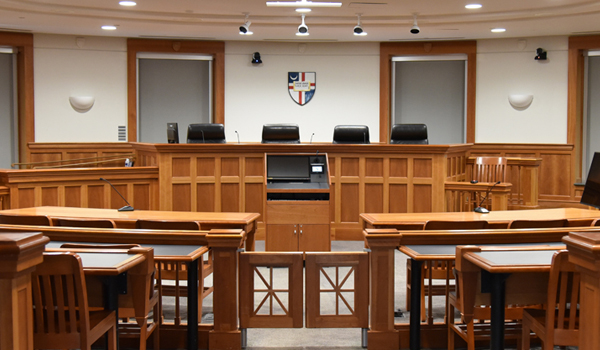 On February 26-27, 2021, The Catholic University of America Columbus School of Law (Catholic Law) hosted thirty rising law clerks from all over the country who will be serving in the chambers of Federal Circuit Courts, Federal District Courts, and State Appellate Courts in the upcoming year. In a time when many events and opportunities have been postponed or canceled due to the ongoing pandemic, the conference provided a welcome exception and opportunity for learning for those in attendance.
On February 26-27, 2021, The Catholic University of America Columbus School of Law (Catholic Law) hosted thirty rising law clerks from all over the country who will be serving in the chambers of Federal Circuit Courts, Federal District Courts, and State Appellate Courts in the upcoming year. In a time when many events and opportunities have been postponed or canceled due to the ongoing pandemic, the conference provided a welcome exception and opportunity for learning for those in attendance.
The two-day, virtual conference provided the conferees the opportunity to learn the particulars of judicial opinion writing—a unique conference focus undertaken by the Law School to serve both the bench and bar by training law students in this important skill. The first day of the conference included instruction from Judge Kyle Duncan of the Fifth Circuit Court of Appeals, Judge Paul Matey of the Third Circuit Court of Appeals, Judge Chad Readler of the Sixth Circuit Court of Appeals, and Judge Lawrence VanDyke of the Ninth Circuit Court of Appeals, who went over opinions they had written or admired to illustrate what goes into the opinion-writing process. They also took questions from the clerks about their strategic choices.
The second day of the conference had the clerks divided into breakout sessions of five each, in which Judge James Boasberg of the U.S. District Court for the District of Columbia, Judge Dabney Friedrich of the U.S. District Court for the District of Columbia, Judge John Gallagher of the U.S. District Court for the E.D. Pennsylvania, Judge Joseph Leeson of the U.S. District Court for the E.D. Pennsylvania, Judge Steven C. Seeger of the U.S. District Court for the N.D. of Illinois, and Judge Edward Meyers of the U.S. Court of Federal Claims reviewed and critiqued draft opinions the clerks had written on a First Amendment problem derived from Catholic Law’s past Seigenthaler-Sutherland Cup National First Amendment Moot Court Competition problem. This dimension of the conference provided a means by which the clerks could apply the skills they were learning about and receive comments from the bench for whom they write. The conference ended with a panel discussion of current and former judicial clerks—Professor Joel Alicea, Will Haun '12, Anika Smith '20, and Jack Vivian '17—who took questions from the conferees about clerkship tenures in general.
The conferees are all eligible for the CSL Prize in Judicial Clerkship Opinion Writing, to be judged by the aforementioned judges, which will be based on another problem from Catholic Law's past Seigenthaler-Sutherland Cup National First Amendment Moot Court Competition.
The event is the inaugural venture of this type by Catholic Law and is planned to take place every spring semester. For questions, contact Catholic Law’s Faculty Director of Bench and Bar Programs, Professor A.G. Harmon: harmon@law.edu.
